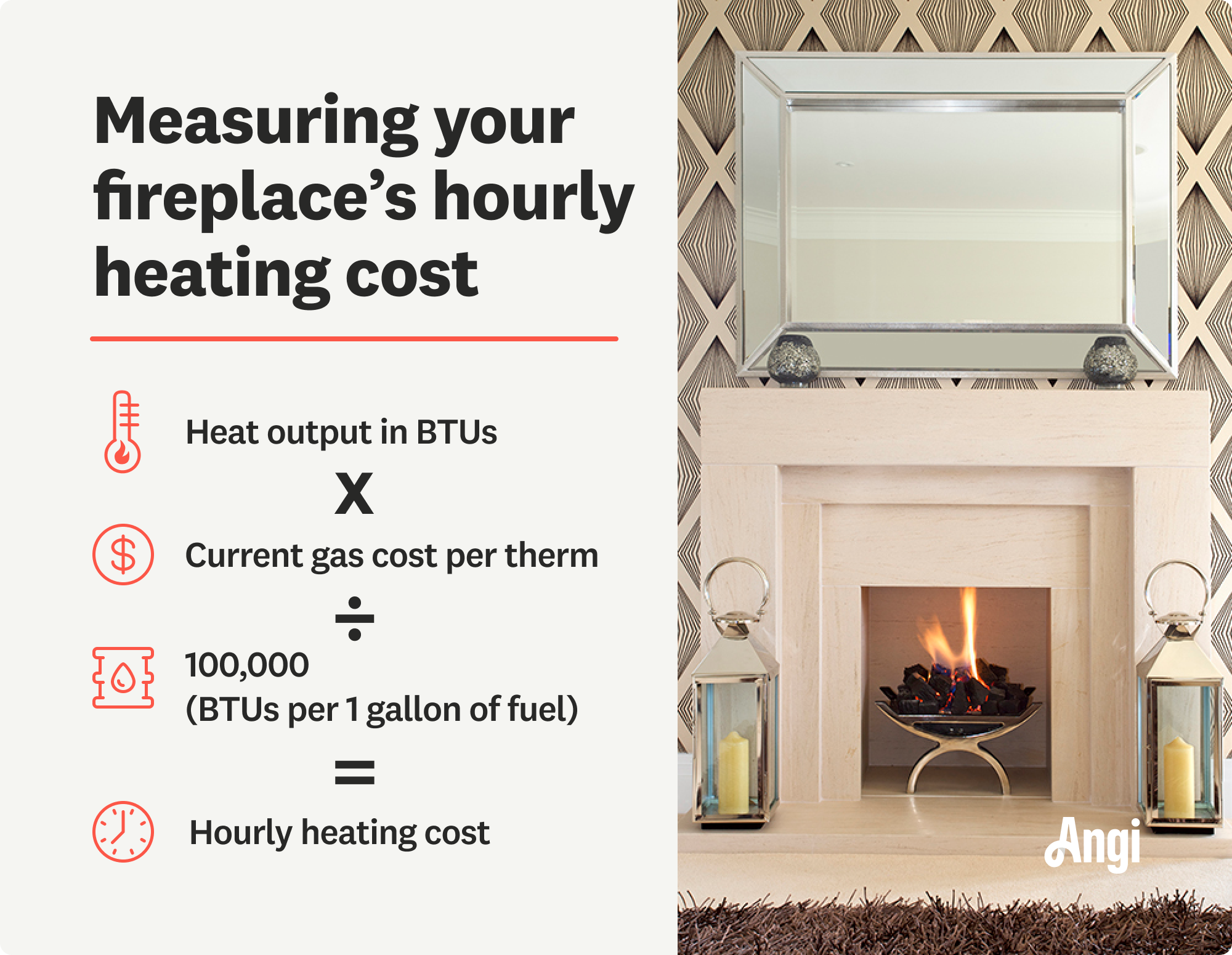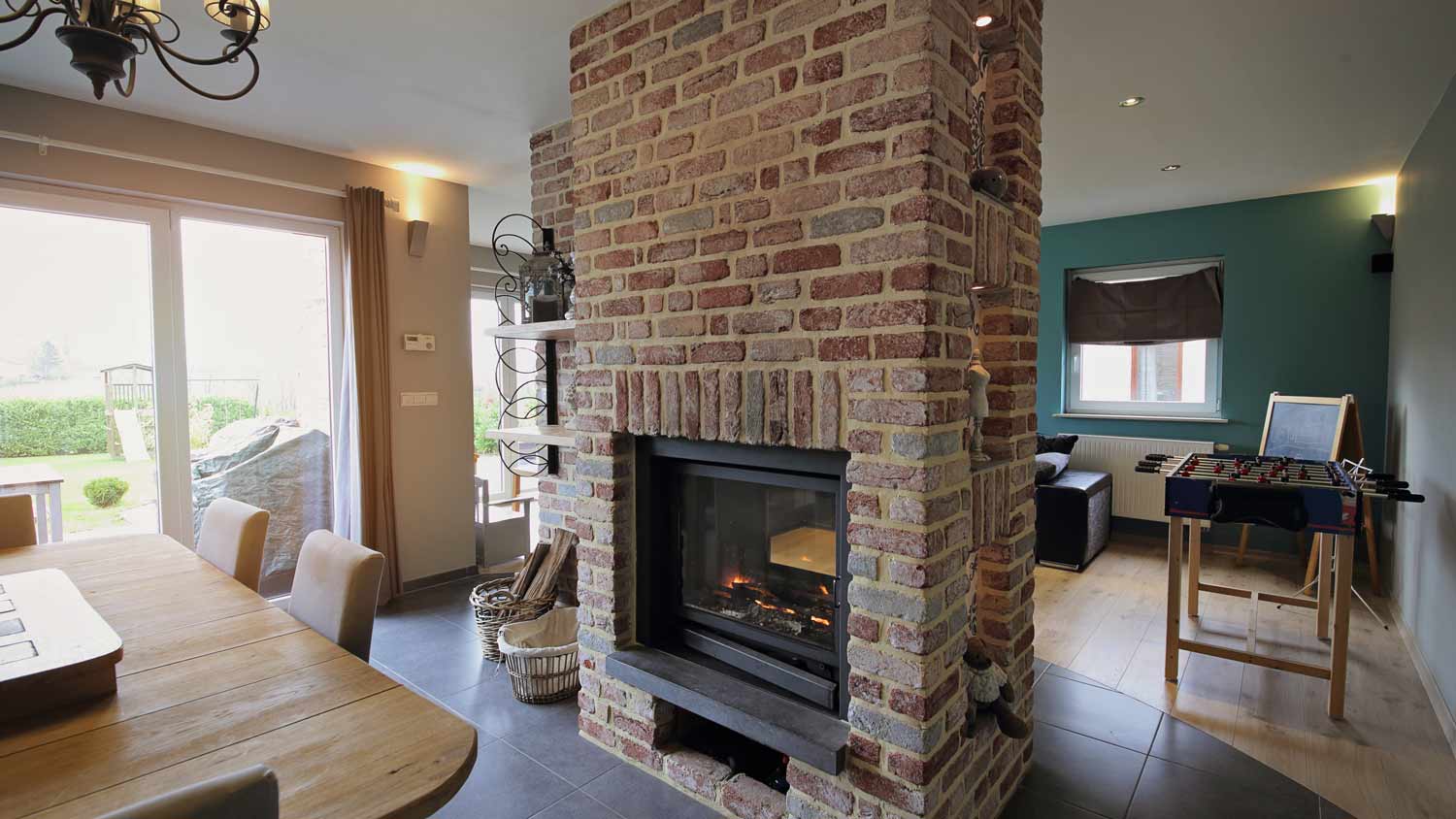
The up-front cost of an electric fireplace is lower than a gas or wood-burning fireplace. This guide will help you understand what you're paying for.
Fireplace service costs depend on your project and location. Check with a local pro for your specific job.
Converting a wood fireplace to a gas one can increase your home value because they’re more efficient and easier to use.
If your existing fireplace is electric rather than wood burning, your costs will be significantly higher, and the project will require major renovations.
Ventless gas fireplaces are significantly more affordable than vented ones, but they aren’t as clean and may be illegal in your area.
Running a gas line can be expensive (up to $1,000), especially if your new fireplace isn’t placed along an exterior wall.
The average cost to convert a fireplace to gas is $3,000, but there are a few different factors to consider—like the type of fireplace you want and whether or not you already have natural gas lines running to your home—that can leave your total anywhere between $500 and $5,500.
There are many reasons to prefer a gas fireplace over other types of fireplaces—the convenience of starting a roaring fire with just a knob and an igniter, for one. Gas fireplaces are also more efficient and easier to maintain because you don’t need to stock up and store wood or clean up ash and soot. And gas fireplaces can also provide more heat and warmth than most other types. In this guide, we’ll explain the cost to convert a fireplace to gas and all of the factors you’ll need to consider along the way.
The type of gas fireplace you want has the greatest impact on cost. There are two main kinds of gas fireplaces: vented and ventless gas fireplaces. You can equip either of these types of gas fireplaces with gas fireplace inserts, which look like logs to improve the aesthetic of your fireplace. Fireplace inserts costs on average $3,600, with vented gas fireplaces being more expensive than ventless.
| Type of Fireplace | Average Cost |
|---|---|
| Vented | $5,000 |
| Ventless | $1,500 |
To understand more about the decision between vented and ventless gas fireplaces, explore the tables and comparisons below.
| Vented Gas Fireplaces | Ventless Gas Fireplaces |
|---|---|
| Lose heat to outside | Provide more heat to living space |
| Burn less efficiently | Burn more efficiently |
| Vent pollutants to exterior | Add some pollutants to indoor air |
| Most expensive gas fireplace | Far less expensive |
| Require chimney or vent | No ventilation required |
| Always up to building code | Not legal in some areas |
A vented gas fireplace costs an average of around $5,000, making it the most expensive type to install.
Vented gas fireplaces, unsurprisingly, include a vent to the exterior of your home. The vent collects materials left over after combustion, which can be hazardous to your health, according to the Environmental Protection Agency. To continue feeding the flame the oxygen it needs to burn, the venting system also pulls air from your living space.
Vented gas fireplaces are less efficient both in how the gas burns and in how they heat your home. You’re essentially paying to heat air that gets pumped outside, so they provide far less heat to your home’s interior than ventless fireplaces.
As you can probably imagine, installing a vented gas fireplace where you don’t already have a traditional fireplace and chimney can be expensive and time-consuming.
A ventless gas fireplace doesn’t have any vent to the exterior of your home, so the average cost is much lower, usually around $1,500.
Ventless gas fireplaces don’t require vents because they burn the natural gas more efficiently. The leftover pollutants from combustion are released into your living space. Although they aren’t plentiful, some people have concerns about the effect on indoor air quality. Due to the safety concerns of ventless fireplaces, some building departments outlaw them.
Ventless gas fireplaces burn more efficiently, but they also heat your home better because the heated air isn’t lost to the outside. You should weigh the pros and cons of ventless gas fireplaces carefully before deciding.
The final price of converting a fireplace to gas includes more than the unit alone. Though the total cost will be different depending on your needs, other factors play a part as well.
| Cost Factor | Average Cost |
|---|---|
| Running a natural gas line | $200–$1,000 |
| Chimney cleaning | $100–$150 |
| Installing gas log or insert | $500–$2,000 |
Depending on your floor plan, installing a natural gas line to your fireplace can be relatively simple … or not. For instance, putting in a long gas line on an interior wall is more challenging than adding a gas line through an exterior wall.
If you don’t already have a natural gas line near the area, the cost to install one will be around $200 to $1,000 on top of the labor and material costs, and the work will need to be performed by a local licensed professional.
A plumber typically charges around $75 to $100 per hour, so if you don’t already have a gas line installed near the fireplace or need one connected, factor this into the total costs of your fireplace conversion. Running gas lines can run an average of $15 to $25 per linear foot in addition to labor costs.
Having your chimney professionally cleaned before installing a new gas fireplace is also a good idea. You’ll pay $100 to $150 for a local professional chimney cleaner. Your gas plumber or contractor may be able to connect you with someone or roll this cost into their total estimate.
Cleaning your chimney might seem like an unnecessary expense, but it can help prevent house fires, so it’s always a good idea if you’re having work done anyway.
Most homeowners pay $2,000 to $5,000 to convert to a gas fireplace using an insert or gas logs (rather than installing an all-new gas line). Of course, prices will change based on the brand you choose, the project’s complexity, and labor costs in your area. A local fireplace professional can give you more information on the time and parts required.

Working with gas can be very dangerous and even harmful to your health. Only attempt gas projects yourself if you have the experience and credentials to do so safely. Otherwise, let the professionals handle these jobs.
Converting a fireplace to gas isn’t a project you should attempt to DIY. Many areas require a licensed professional to do any work with gas lines, and even if it isn’t legally required, it’s still not safe for homeowners to tackle this project. Hire a gas fireplace service near you to safely convert your fireplace so it’s compliant with local codes.
Code requirements aside, hiring a pro for this job is still the way to go—here’s why:
A gas fireplace pro can safely connect your gas line and regulate it properly for the new fireplace.
Professionals can ensure your fireplace is properly vented to keep fumes out of your home.
A pro can help you select the right fireplace insert for your fireplace size and home heating needs.
Gas fireplace professionals can safely adapt an existing chimney to vent a gas fireplace.
Let the pro know if you have an existing fireplace, chimney, and gas line so they have an idea of the project’s scope.
Prepare to budget for gas line installation if you don’t already have one running to the fireplace.
Discuss the different types of gas fireplaces to decide which will work best in your home.
Find out if a permit is required for gas work and whose responsibility it is to obtain one.
Home is the most important place on earth, which is why Angi has helped more than 150 million homeowners transform their houses into homes they adore. To help homeowners with their next project, Angi provides readers with the most accurate cost data and upholds strict editorial standards. We extensively research project costs to develop the pricing data you see, so you can make the best decisions for you and your home. We rely on reputable sources, including the U.S. Bureau of Labor Statistics, academic journals, market studies, and interviews with industry experts—all to ensure our prices reflect real-world projects.
Want to help us improve our cost data? Send us a recent project quote to [email protected]. Quotes and personal information will not be shared publicly.
From average costs to expert advice, get all the answers you need to get your job done.

The up-front cost of an electric fireplace is lower than a gas or wood-burning fireplace. This guide will help you understand what you're paying for.

The average cost to remove a fireplace is $4,500, but your overall cost will depend on the type of fireplace, its condition, and other factors.

If you’re thinking about installing a new fireplace, you might wonder: How much does it cost to run a gas fireplace? Let’s review the numbers.

Wondering how to put out a fire in a fireplace? Put down that bucket of water — we’ll show you how to put out fire the right way.

Learn how to remove a fireplace insert, and create the cozy hearth of your dreams—in just 9 simple steps.

What is a fireplace insert? It’s like a traditional fire in a box—which helps keep the heat it generates in your house, rather than draining out the chimney.